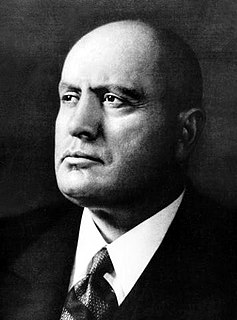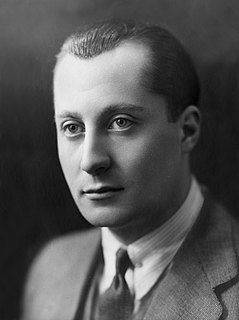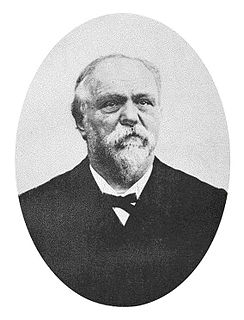 W
WNimio de Anquín (1896–1979) was an Argentine Thomist writer and fascist politician. Seeking to combine European models of fascism with his own attachment to the Catholic Church he led several movements and for a time had a strong following. Subsequently, however, he lost political influence and his later life was mainly focused on his academic career.
 W
WMichele Bianchi was an Italian revolutionary syndicalist leader who took a position in the Unione Italiana del Lavoro (UIL) He was among the founding members of the Fascist movement. He was widely seen as the dominant leader of the leftist, syndicalist wing of the National Fascist Party. He took an active role in the "interventionist left" where he "espoused an alliance between nationalism and syndicalism." He was one of the most influential politicians of the regime before his succumbing to tuberculosis in 1930. He was also one of the grand architects behind the "Great List" which secured the parliamentary majority in favor of the fascists.
 W
WGiuseppe Bottai was an Italian journalist, and member of the National Fascist Party of Benito Mussolini.
 W
WElse Christensen (1913–2005) was a Danish proponent of the modern Pagan new religious movement of Heathenry. She established a Heathen organisation known as the Odinist Fellowship in the United States, where she lived for much of her life. A Third Positionist ideologue, she espoused the establishment of an anarcho-syndicalist society composed of racially Aryan communities.
 W
WJesús de Cora y Lira, 1st count of Cora y Lira (1890–1969) was a Spanish military and a Carlist politician. In the navy juridical arm he rose to general auditor, a rank equivalent to counter-admiral. He is known mostly as political leader of Carloctavismo, a branch of Carlism which during early Francoism advocated a claim to the Spanish throne raised by Carlos Pio Habsburgo-Lorena y Borbón.
 W
WAlceste De Ambris was an Italian syndicalist, the brother of fascist politician Amilcare De Ambris. De Ambris had a major part to play in the agrarian strike actions of 1908 in Parma.
 W
WFrancisco Estévanez Rodríguez was a Spanish politician, publisher, philanthropist, agrarian syndicalist and religious activist. He is best known as deputy to the Cortes during two terms between 1931 and 1936. Politically he was a Traditionalist, first member of the Integrist branch and then active within Carlism. He also published two small Burgos periodicals, continuously donated money and supported various charity schemes, strove to build rural trade unions which unite landholders and farmers, and was involved in numerous Catholic initiatives usually related to the Burgos archbishopric office.
 W
WRoberto Farinacci was a leading Italian Fascist politician and important member of the National Fascist Party before and during World War II as well as one of its ardent antisemitic proponents. English historian Christopher Hibbert describes him as "slavishly pro-German".
 W
WRoberto Forges Davanzati was an Italian journalist, academic and politician. Initially a syndicalist, he later became a nationalist and fascist.
 W
WAlfonso García-Valdecasas y García-Valdecasas was a Spanish professor of civil law, lawyer, politician, and founding member of the Falange Española.
 W
WRicardo Gómez Roji (1881–1936) was a Spanish Roman-Catholic priest, scholar, publisher and politician. For 26 years he served as a lecturing canon by the Burgos cathedral, known locally for his oratory skills; he also taught theology at the Pontifical University of Salamanca, animated local Catholic agrarian trade unions, and edited and managed few Catholic periodicals and bulletins. His political career climaxed in 1931–1933; elected to the Congress of Deputies as a candidate of a broad local monarchist-Integrist-conservative alliance, he served one term within the Agrarian parliamentary minority. Afterwards he approached Carlism and advanced its cause as a propagandist.
 W
WÉmile Janvion was a French teacher, an anarcho-syndicalist leader, a founder of the Confédération générale du travail (CGT) and a leader of the anti-militarist movement. He came to hold national syndicalist views that prefigured fascism. He was anti-Semitic, hostile to freemasonry, hostile to the republic and flirted with monarchism. However his main goal was the nationalization of the land and of the means of production.
 W
WHubert Lagardelle was a pioneer of French revolutionary syndicalism. He regularly authored reviews for the Plans magazine, was co-founder of the journal Prélude, and Minister of Labour in the Vichy regime.
 W
WJosé María Lamamié de Clairac y Colina (1887-1956) was a Spanish politician. He supported the Traditionalist cause, until the early 1930s as an Integrist and afterwards as a Carlist. Among the former he headed the regional León branch, among the latter he rose to nationwide executive and became one of the party leaders in the late 1930s and the 1940s. In 1931-1936 he served 2 terms in the Cortes; in 1915-1920 he was member of the Salamanca ayuntamiento. In historiography he is known mostly as representative of Castilian terratenientes; as president of Confederación Nacional Católico-Agraria he tried to preserve the landowner-dominated rural regime, first opposing the Republican and later the Francoist designs.
 W
WRamiro Ledesma Ramos was a Spanish philosopher, politician, writer, essayist, and journalist, known as one of the pioneers in the introduction of Fascism in Spain.
 W
WBenito Amilcare Andrea Mussolini was an Italian politician and journalist who founded and led the National Fascist Party. He was Prime Minister of Italy from the March on Rome in 1922 until his deposition in 1943, and "Duce" of Italian Fascism from the establishment of the Italian Fasces of Combat in 1919 until his execution in 1945 by Italian partisans. As dictator of Italy and founder of fascism, Mussolini inspired and supported the international spread of fascist movements during the inter-war period.
 W
WPaolo Orano was an Italian psychologist, politician and writer. Orano began his political career as a revolutionary syndicalist in Italian Socialist Party. He later became a leading figure within the National Fascist Party.
 W
WJosé Antonio Primo de Rivera y Sáenz de Heredia, 1st Duke of Primo de Rivera, 3rd Marquess of Estella, often referred to simply as José Antonio, was a Spanish politician who founded the fascist Falange Española, later Falange Española de las JONS.
 W
WOnésimo Redondo Ortega was a Spanish Falangist politician. He founded Juntas Castellanas de Actuación Hispánica, a political group that merged with Ramiro Ledesma's Juntas de Ofensiva Nacional-Sindicalista and José Antonio Primo de Rivera's Falange Española.
 W
WJesús Requejo San Román (1880-1936) was a Spanish Catholic militant, theorist of society and politician; the Catholic Church declared him a martyr and a candidate for sainthood. He was locally known in the provinces of Zamora and Toledo for his activity in education, charity and agrarian syndicalism. His key work, Principios de Orientación Social, made some moderate impact among Spanish Catholic intellectuals of the mid-1930s. Politically he evolved from centre-left to extreme right: initially Requejo supported the Romanonista dynastic Liberalism, then he turned towards accidentalist Acción Católica, and finally he joined Carlism. His career climaxed in the mid-1930s; since 1934 he headed the provincial Carlist structures in Toledo and in 1936 he served as a Carlist deputy to the Cortes.
 W
WEdmondo Rossoni was a revolutionary syndicalist leader and an Italian fascist politician who became involved in the Fascist syndicate movement during Benito Mussolini's regime.
 W
WGeorges Eugène Sorel was a French social thinker, political theorist, historian, and later journalist. He has inspired theories and movements grouped under the name of Sorelianism. His social and political philosophy owed much to his reading of Proudhon, Karl Marx, Giambattista Vico, Henri Bergson, and later William James. His notion of the power of myth in collective agency inspired socialists, anarchists, Marxists, and Fascists. Together with his defense of violence, it is the contribution for which he is most often remembered.
 W
WGeorges Valois was a French journalist and politician, born in Paris. He was a member of the French resistance and died in the Bergen-Belsen concentration camp.